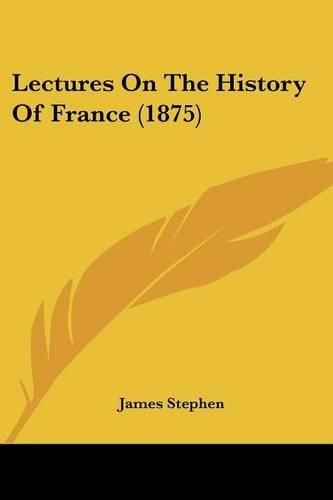Readings Newsletter
Become a Readings Member to make your shopping experience even easier.
Sign in or sign up for free!
You’re not far away from qualifying for FREE standard shipping within Australia
You’ve qualified for FREE standard shipping within Australia
The cart is loading…






Purchase of this book includes free trial access to www.million-books.com where you can read more than a million books for free. This is an OCR edition with typos. Excerpt from book: LECTURE III. ON THE CHARACTER AND INFLUENCE OF CHARLEMAGNE. In my last lecture, I endeavored to trace the subversion of the Merovingian Dynasty to the barbarism which characterized alike the princes of that race and their civil and military institutions. There was, however, nothing barbarous in the agency by which their overthrow was accomplished. We should search the history of mankind in vain for any series of four successive monarchs, following each other in a direct hereditary lineage, to whom the praise of large capacity, of resolute purposes, and of splendid achievements, is so justly due as to Pepin of Heristal and his posterity to the third generation. That the descendants, first of Clovis and then of Charlemagne, pursued the same disastrous path to the same ultimate ruin, is, therefore, a coincidence which we may not ascribe to any similarity in the views or in the character of their respective progenitors. For it is not without reason that panegyric has so exhausted her powers in celebrating the great founder of the Carlovingian empire; and that, among the heroes of former ages, his name alone enjoys a kind of double immortality: the one, the deliberate award of history; the other, the prodigal gift of fiction and romance. What, then, were the causes which defeated even the genius of Charlemagne in his attempt to prolong, beyond his own life, either the empire which he restored, the polity which he established, or the code of laws which he promulgated ? To resolve that question, we must bear in mind that, in common with all the great actors on the theatre of the world, he lived, not in obedience to occasional impulses, but under the government of certain fixed rules and maxims of conduct; that though some of these principles were the indigenous growth of his own m…
$9.00 standard shipping within Australia
FREE standard shipping within Australia for orders over $100.00
Express & International shipping calculated at checkout
Stock availability can be subject to change without notice. We recommend calling the shop or contacting our online team to check availability of low stock items. Please see our Shopping Online page for more details.
Purchase of this book includes free trial access to www.million-books.com where you can read more than a million books for free. This is an OCR edition with typos. Excerpt from book: LECTURE III. ON THE CHARACTER AND INFLUENCE OF CHARLEMAGNE. In my last lecture, I endeavored to trace the subversion of the Merovingian Dynasty to the barbarism which characterized alike the princes of that race and their civil and military institutions. There was, however, nothing barbarous in the agency by which their overthrow was accomplished. We should search the history of mankind in vain for any series of four successive monarchs, following each other in a direct hereditary lineage, to whom the praise of large capacity, of resolute purposes, and of splendid achievements, is so justly due as to Pepin of Heristal and his posterity to the third generation. That the descendants, first of Clovis and then of Charlemagne, pursued the same disastrous path to the same ultimate ruin, is, therefore, a coincidence which we may not ascribe to any similarity in the views or in the character of their respective progenitors. For it is not without reason that panegyric has so exhausted her powers in celebrating the great founder of the Carlovingian empire; and that, among the heroes of former ages, his name alone enjoys a kind of double immortality: the one, the deliberate award of history; the other, the prodigal gift of fiction and romance. What, then, were the causes which defeated even the genius of Charlemagne in his attempt to prolong, beyond his own life, either the empire which he restored, the polity which he established, or the code of laws which he promulgated ? To resolve that question, we must bear in mind that, in common with all the great actors on the theatre of the world, he lived, not in obedience to occasional impulses, but under the government of certain fixed rules and maxims of conduct; that though some of these principles were the indigenous growth of his own m…